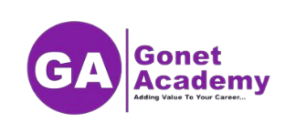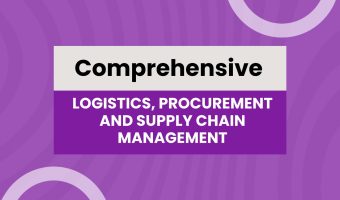Comprehensive Logistics, Procurement and Supply Chain Management
About This Course
This 6-month Comprehensive Logistics, Procurement, and Supply Chain Management program equips participants with practical and professional skills in planning, sourcing, storage, distribution, and contract management. It is structured to support the strategic, operational, and compliance responsibilities of procurement and logistics units, ensuring participants gain end-to-end competencies in supply chain management.
Learning Objectives
Understand the structure, components, and functions of logistics, procurement, and supply chain management (SCM) systems in various sectors.
Plan and execute effective procurement processes, including sourcing strategies, supplier evaluation, and compliance with public and donor regulations.
Manage logistics operations and inventory control systems, including warehousing, transportation, and delivery planning.
Apply procurement procedures and develop key documents, such as purchase orders, bid documents, and procurement plans.
Implement contract management principles and understand legal frameworks such as INCOTERMS, contract types, and dispute resolution.
Integrate financial principles into procurement and logistics operations, including cost analysis, invoice processing, and budgeting.
Utilize digital tools and ERP systems for procurement and inventory management (e.g., Excel, QuickBooks, SAP, OpenERP).
Understand and manage emergency and humanitarian procurement in crisis settings, including pre-positioning and fast-track processes.
Design and present a comprehensive procurement or logistics strategy during the capstone project.
Target Audience
- Procurement officers, logistics managers, warehouse personnel, supply chain officers, NGO & business staff, and aspiring professionals
Curriculum
78h
Module 1: Introduction to Logistics and Procurement
This foundational module introduces participants to the key concepts, functions, and interdependencies of logistics and procurement. It explores how procurement and logistics fit within the broader supply chain and organizational strategy, including an overview of public versus private sector approaches and the significance of ethical and sustainable practices.
Topics Covered:
- Definition and Scope of Procurement and Logistics
- Supply Chain Management Overview
- Objectives and Importance of Procurement & Logistics
- Key Stakeholders in the Supply Chain
- Organizational Models and Structures
- Ethical and Sustainable Procurement Principles
- Overview of Public vs Private Procurement Practices
Module 2: Procurement Planning and Needs Assessment
This module emphasizes strategic procurement planning and needs assessment as critical starting points for any procurement cycle. Participants will learn to conduct stakeholder-driven needs identification and forecasting aligned with budgets and risk analysis.
Topics Covered:
- Procurement Planning Process
- Market Analysis and Supplier Mapping
- Needs Identification and Prioritization
- Procurement Forecasting
- Budget Alignment and Authorization
- Risk Assessment in Planning
- Requisition and Approval Process
Module 3: Sourcing and Supplier Management
Focusing on supplier engagement and sourcing strategies, this module guides participants through procurement methods, supplier selection, and performance management. It highlights relationship-building and negotiation techniques for long-term value creation.
Topics Covered:
- Procurement Methods (RFQ, RFP, ITB, Direct Purchase, Framework)
- Vendor Selection Criteria and Evaluation Tools
- Supplier Prequalification and Due Diligence
- Contract Negotiation Techniques
- Vendor Relationship Management (VRM)/Vendor Management Inventory (VMI)
- Supplier Performance Evaluation
- Local vs International Sourcing
Module 4: Logistics Operations and Inventory Management
Participants will gain insight into logistics planning, warehousing, transportation, and inventory systems. This module connects the physical movement of goods to inventory strategies, stock management methods, and delivery optimization.
Topics Covered
- Stock Replenishment Methods (FIFO, LIFO, EOQ, JIT)
Warehouse layout and Operations
- Transportation and Fleet Management
- Route Optimization and Delivery Tracking
- Cold Chain and Specialized Logistics
- Tools: Inventory Register, Delivery Notes, Waybills
Module 5: Procurement Procedures and Documentation
This module explores the operational workflows of procurement, focusing on key documentation, including requisitions, purchase orders, bid evaluations, and audit trails. It emphasizes procedural compliance, standard operating procedures, and transparency.
Topics Covered:
- Procurement Manual and SOPs
- Requisition Forms, Purchase Orders (PO), and Contracts
- Bid Documents and Evaluation Reports
- Compliance with Donor/Gov’t Procurement Rules (PPCC)
- Procurement Audit Readiness
- Document Retention and Filing Systems
Module 6: Contract Management and Legal Compliance
Participants will explore the legal and contractual framework within which procurement operates. This includes contract types, negotiation, compliance with laws, and risk mitigation, particularly in managing disputes and adhering to INCOTERMS and procurement acts.
Topics Covered:
- Contract Types and Clauses
- Contract Implementation and Monitoring
- Contract Risk and Dispute Management
- Legal Frameworks (PPCC Act, UNCITRAL)
- Breach, Termination, and Remedies
- INCOTERMS and International Shipping Terms
Module 7: Financial Management in Procurement and Logistics
This module equips learners with essential financial tools for managing procurement costs and budgeting. It addresses internal controls, invoice verification, cost-benefit analysis, and fraud prevention mechanisms.
Topics Covered:
- Procurement Budgets and Costing
- Invoice Verification and Payment Cycles
- Internal Controls and Fraud Prevention
- Financial Reporting and Reconciliation
- Cost-Benefit Analysis in Sourcing
- Linking Procurement to Organizational Budgets
Module 8: ICT Tools and Systems for SCM
Exploring the digital transformation of procurement and logistics, this module introduces various ERP systems, procurement platforms, and inventory management tools. Participants will also examine data security and the integration of automation in SCM operations.
Topics Covered:
- Procurement Software and ERP Systems (e.g., SAP, QuickBooks, OpenERP)
- e-Procurement Platforms and Portals
- Logistics Tracking Software
- Digital Inventory Management
- Document Automation and Online Archiving
- Data Protection and Cybersecurity
Module 9: Humanitarian and Emergency Procurement
This module prepares participants to manage procurement and logistics under emergency or crisis conditions. Topics include rapid procurement, pre-positioning of supplies, and donor-specific compliance requirements in humanitarian contexts.
Topics Covered:
- Rapid Procurement and Fast-Track Procedures
- Emergency Logistics Planning
- Pre-positioning and Buffer Stocks
- Procurement in Conflict Zones and Disaster Relief
- Donor Procurement Guidelines (UN, WB, EU, etc.)
- Accountability and Anti-Corruption Measures
Module 10: Capstone Project and Strategic SCM
In this final module, participants consolidate their learning by developing and presenting a strategic supply chain project. The module fosters integration of concepts and preparation for professional certification, combining presentation, peer feedback, and instructor evaluation.
Topics Covered:
- Develop a Comprehensive Procurement & Logistics Strategy
- Supply Chain Mapping for a Real/Simulated Organization
- Presentation of Final Projects
- Peer Review and Evaluation





